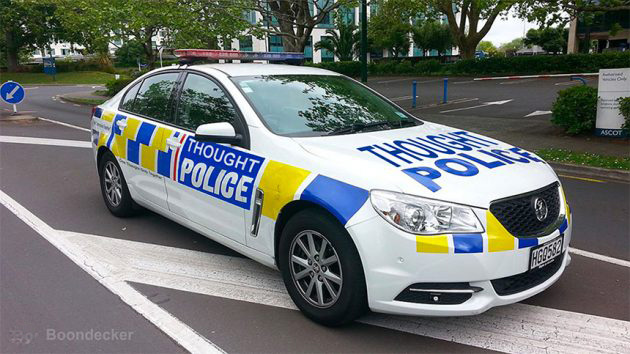Lindsay Perigo
solopassion.com
When Parliament rushed through the Wuhan Virus Public Health Response Bill last week, the redoubtable Cameron Slater observed that New Zealand had thereby formally become a police state. The following atrocities from the Act make clear that this claim was not hyperbole.
Allow time for the enormity of these abominations to sink in. Note the repeated use of the term “without limitation” in the enumeration of the totalitarian powers granted here. Ask yourself how long it will be before unWoke opinions, especially on the subject of the Wuhan virus, are deemed by Woke “enforcement officers,” unelected and unaccountable, to promote the spread thereof or hinder efforts to prevent the spread thereof; how long before Woke constables raid the houses of the offending unWoke opiners without a warrant—as they are now empowered to do—and haul them off to indefinite solitary confinement in some specified Gulag—as they are now empowered to do?
There are no words to express the treasonous viciousness of this legislation; none to capture the evil of the regime that passed it. Tragically, if the words did exist, very few would use them; part of the success of the Fascist Woke is that they have created a world in which evil is deemed merely “concerning,” “troubling,” “disappointing” or “problematic.”
We are no longer part of the Free World; we are indeed a police state, a dictatorship and a banana republic, tyrannised by a grotesque, fry-quacking, upward-inflecting, infantile/moronnial, Narcissistic gargoyle whose stupidity is matched only by her evil and whose power is now “without limitation.” That is not “concerning”; it is cataclysmic:
11 Orders that can be made under this Act
(1) An order made by the Minister or the Director-General (as the case may be) under this section may do 1 or more of the following things:
(a) require persons to refrain from taking any actions that contribute or are likely to contribute to the risk of the outbreak or spread of COVID-19, or require persons to take any actions, or comply with any measures, that contribute or are likely to contribute to preventing the risk of the outbreak or spread of COVID-19, including (without limitation) requiring persons to do any of the following:
(i) stay in any specified place or refrain from going to any specified place:
(ii) refrain from associating with specified persons:
(iii) stay physically distant from any persons in any specified way:
(iv) refrain from travelling to or from any specified area:
(v) refrain from carrying out specified activities (for example, business activities involving close personal contact) or require specified activities to be carried out only in any specified way or in compliance with specified measures:
(vi) be isolated or quarantined in any specified place or in any specified way:
(vii) refrain from participating in gatherings of any specified kind, in any specified place, or in specified circumstances:
(viii) report for medical examination or testing in any specified way or in any specified circumstances:
(b) in relation to any places, premises, crafts, vehicles, animals, or other things, require actions to be taken, require compliance with any measures, or impose prohibitions that contribute or are likely to contribute to preventing the risk of the outbreak or spread of COVID-19, including (without limitation) any of the following:
(i) require things to be closed or only open if specified measures are complied with:
(ii) prohibit things from entering any port or place, or permit the entry of things into any port or place only if specified measures are complied with:
(iii) prohibit gatherings of any specified kind in any specified places or premises, or in any specified circumstances:
(iv) require things to be isolated, quarantined, or disinfected in any specified way or specified circumstances:
(v) require the testing of things in any specified way or specified circumstances.
(2) An order made by the Minister may specify which breaches of an order made by the Minister or the Director-General are infringement offences for the purposes of section 25(3).
18 Authorised persons
(1) The Director-General may authorise a suitably qualified and trained person who is not an employee of the Ministry of Health, or a class of suitably qualified and trained persons who are not employees of the Ministry of Health, to carry out any functions and powers of an enforcement officer under this Act.
20 Powers of entry
(1) An enforcement officer may enter, without a warrant, any land, building, craft, vehicle, place, or thing if they have reasonable grounds to believe that a person is failing to comply with any aspect of a section 11 order.
(2) However, subsection (1) does not apply to a private dwellinghouse or marae.
(3) A constable may enter a private dwellinghouse or marae without warrant only if they have reasonable grounds to believe that people have gathered there in contravention of a section 11 order and entry is necessary for the purpose of giving a direction under section 21.
(4) A constable exercising a power of entry under this section may use reasonable force in order to effect entry into or onto the land, building, craft, vehicle, place, or thing if, following a request, a person present refuses entry or does not allow entry within a reasonable time. …
21 Power to give directions
An enforcement officer who has reasonable grounds to believe that a person is contravening or likely to contravene a section 11 order may—
(a) direct any person to stop any activity that is contravening or likely to contravene the order:
(b) direct any person, either verbally or in writing, to take any action to prevent or limit the extent of the person’s non-compliance.
If you enjoyed this BFD article please consider sharing it with your friends.

